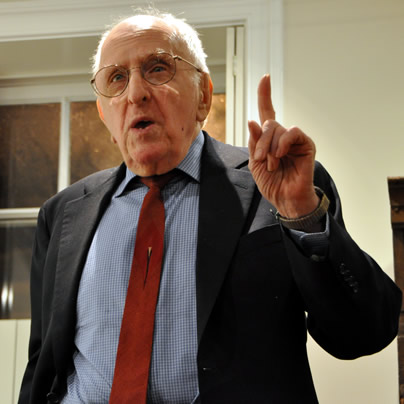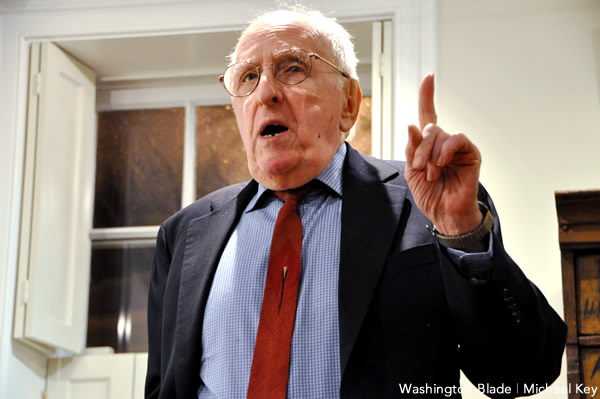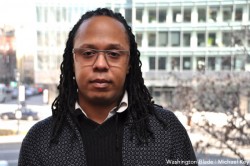National
Kameny’s ashes still not buried 2 years after death
Activist says heir to estate may be responsible for delay in signing agreement


Activist Frank Kameny died on Oct. 11, 2011. His remains have not yet been buried. (Washington Blade file photo by Michael Key)
A memorial site recognizing the legacy of the late D.C. gay rights pioneer Frank Kameny was scheduled to be unveiled Friday, Oct. 11, in Chicago on the second anniversary of his death while plans for the burial of his ashes in Washington remain stalled.
New information behind that unusual turn of events emerged this week from one of the parties in a dispute over ownership of the planned interment site for Kameny’s ashes in D.C.’s historic Congressional Cemetery.
Marvin Carter, executive director of the local LGBT charitable group Helping Our Brothers and Sisters (HOBS), said his attorney told him an agreement reached about two months ago in which HOBS would transfer ownership of the cemetery plot to the Kameny estate was awaiting the signature of Timothy Clark, Kameny’s friend, housemate and principal heir to the estate.
“The last update I got was we are all in agreement but Ackerman Brown cannot find Clark to sign the paperwork,” Carter told the Blade.
Carter was referring to the D.C. law firm Ackerman Brown, which has represented Clark in legal matters pertaining to the estate since shortly after Kameny died in his home of natural causes on National Coming Out Day on Oct. 11, 2011. In his will, Kameny left his house and all other possessions except his voluminous gay rights papers to Clark. He bequeathed his papers to the Library of Congress. Kameny’s house sold last year for $725,000.
Glen Ackerman, managing partner of Ackerman Brown, emailed a statement to the Blade this week disputing Carter’s assertion that Clark can’t be found.
“Ackerman Brown is in regular contact with Timothy Clark, the personal representative of the Estate of Frank E. Kameny and all negotiations on behalf of our client have been in good faith,” the statement said. “The decision regarding interment of Frank Kameny’s ashes rests solely with Mr. Clark and he is discharging his duties with full knowledge of the past negotiations. Neither Marvin Carter nor his attorney have ever discussed the placement of a monument in lieu of the cemetery plot with Ackerman Brown.”
Ackerman noted that the status of the negotiations between Ackerman Brown and HOBS over the ownership transfer of the cemetery plot had not changed since July. At that time, Ackerman’s law partner, Christopher Brown, said a “tentative agreement” had been reached to end the dispute that has prevented Kameny’s ashes from being interred for nearly two years.
“The tentative agreement was reached on July 9 and the estate is awaiting further input from HOBS’ counsel that is necessary to finalize the transaction,” Brown said in a July 24 statement to the Blade.
“The estate has always been, and remains willing to work with gay community representatives who knew Frank Kameny in organizing a burial service and appropriate gravesite at which members of the community could pay tribute to Kameny,” Brown said in his July statement.
Earlier this year, Carter said HOBS dropped a previous condition that called for the Kameny estate to pay HOBS for the cemetery plot that HOBS purchased with money donated by members of the LGBT community.
“We are not asking for a dime from the estate,” Carter told the Blade in an Oct. 4 interview. “The delay is not on our end.”
Carter said that once the tentative agreement was reached the two parties asked Congressional Cemetery President Paul Williams to draft the documents needed to finalize the ownership transfer of the cemetery plot.
When contacted by the Blade last week, Williams said he could not provide details but suggested the long-awaited resolution to the dispute was in the hands of Clark and his attorneys.
“We have put forth a proposal to the estate and we’re waiting to hear back,” he said. “That’s about all I can say. We’re just waiting to hear back.”

Timothy Clark (Washington Blade file photo by Michael Key)
Clark said in August, one day prior to Brown’s statement to the Blade, that he understood an agreement had been reached over the cemetery plot. He said he was thinking about when to arrange for a burial ceremony and that he would welcome suggestions from Kameny’s friends and fellow activists about the details for such a ceremony.
Clark didn’t respond to a phone message from the Blade this week.
HOBS and a group of Kameny’s friends and colleagues in the LGBT rights movement initially scheduled an interment ceremony for Kameny at Congressional Cemetery for March 3, 2012. At the time, Charles Francis, a Kameny friend who helped Kameny organize his papers to facilitate their donation to the Library of Congress, arranged for the U.S. Department of Veterans Affairs to provide a military headstone for the gravesite that recognized Kameny’s service in the Army in World War II.
With money raised by HOBS, Francis and Kameny’s friends and fellow activists Rick Rosendall and Bob Witeck also arranged for the purchase of a separate headstone for the gravesite bearing the inscription “Gay is Good.” Kameny, who coined that slogan in the 1960s to advance the cause of gay rights, said it was something for which he wanted to be remembered as much if not more than any of his other accomplishments.
But just as both stones were placed at the gravesite, Witeck announced that the burial of Kameny’s ashes had been cancelled after the estate told the cemetery it would not release Kameny’s ashes until it obtained legal ownership of the burial plot from HOBS. Cemetery officials later removed the headstone and “Gay is Good” marker and placed them in storage, saying it was inappropriate for them to remain in place while the ownership of the gravesite was in dispute.
Michael Bedwell, a longtime friend and gay activist colleague of Kameny’s who helped select the gravesite, said the removal of the two stones displaced an important and historic site where people could go to reflect on Kameny’s accomplishments, which he said improved the lives of LGBT people.
“It is a disgrace that people don’t have a place to pay homage to him two years after his passing,” Bedwell said. “I feel those stones should be returned to the site even if the ashes are not interred there at this time.”
Tension between the Kameny estate and Carter, Francis, Witeck and Rosendall increased in the months following the cancellation of the burial when the estate sued the four men on grounds that they removed without permission items from Kameny’s house shortly after his death. The four said they removed the items for safekeeping at a time of confusion following Kameny’s death when Clark, who was living in the house at the time, gave them permission to enter the house to sort through Kameny’s belongings. They said they planned to return the items, some of which were papers slated to go to the Library of Congress.
Rosendall said this week that the men were accompanied by local attorney Michele Zavos when they entered Kameny’s house shortly after his death. Zavos had worked for Kameny and prepared his will, Rosendall said.
Zavos on Wednesday confirmed that she was present during that visit. She said Clark gave them permission to enter the house and that he understood that Rosendall and the other men wanted to look through Kameny’s papers and other historic items to take steps to preserve them.
According to Zavos, it was during that visit that Rosendall, Francis and Witeck found the original signed copy of Kameny’s will and turned it over to Zavos, who read and explained its provision to Clark.
“Tim was completely aware of what we were doing,” she said.
Rosendall added that he was especially troubled when Clark told the Blade in an interview in March 2012 that someone placed an anonymous letter in the mail slot at Kameny’s house where Clark was living that used a racial slur and denounced him for being the beneficiary in Kameny’s will.
“And that’s just horrible for anybody to say,” Clark said in the 2012 interview. “It said, ‘The nigger got everything.’”
When the Blade asked to see the letter, Clark claimed it was so upsetting to him that he discarded it in the trash before realizing it may have been better to keep it and have others help him discover the person who wrote it.
Rosendall, however, said Clark’s disclosure of the letter at a time when the Kameny estate was making public statements accusing him, Carter, Witeck and Francis of improperly taking items from the house could have raised suspicions that they may have been responsible for the anonymous hate letter.
“I was not under any impression that he had made an explicit accusation,” Rosendall said this week. “The whole point was he throws that out there as red meat and there is an implication that somebody else that he was talking about was to blame for it.”
The Blade requested a response from Ackerman to Rosendall’s statements about the hate letter. The Blade further asked Ackerman if anyone besides Clark saw the letter and could corroborate its existence. Ackerman emailed the following statement: “The questions you ask regarding the letter are not relevant to this firm’s representation of the Estate of Franklin E. Kameny and any comment on this topic would be inappropriate.”
U.S. Supreme Court
Supreme Court to consider bans on trans athletes in school sports
27 states have passed laws limiting participation in athletics programs

The U.S. Supreme Court on Thursday agreed to hear two cases involving transgender youth challenging bans prohibiting them from participating in school sports.
In Little v. Hecox, plaintiffs represented by the ACLU, Legal Voice, and the law firm Cooley are challenging Idaho’s 2020 ban, which requires sex testing to adjudicate questions of an athlete’s eligibility.
The 9th U.S. Circuit Court of Appeals described the process in a 2023 decision halting the policy’s enforcement pending an outcome in the litigation. The “sex dispute verification process, whereby any individual can ‘dispute’ the sex of any female student athlete in the state of Idaho,” the court wrote, would “require her to undergo intrusive medical procedures to verify her sex, including gynecological exams.”
In West Virginia v. B.P.J., Lambda Legal, the ACLU, the ACLU of West Virginia, and Cooley are representing a trans middle school student challenging the Mountain State’s 2021 ban on trans athletes.
The plaintiff was participating in cross country when the law was passed, taking puberty blockers that would have significantly reduced the chances that she could have a physiological advantage over cisgender peers.
“Like any other educational program, school athletic programs should be accessible for everyone regardless of their sex or transgender status,” said Joshua Block, senior counsel for the ACLU’s LGBTQ and HIV Project. “Trans kids play sports for the same reasons their peers do — to learn perseverance, dedication, teamwork, and to simply have fun with their friends,” Block said.
He added, “Categorically excluding kids from school sports just because they are transgender will only make our schools less safe and more hurtful places for all youth. We believe the lower courts were right to block these discriminatory laws, and we will continue to defend the freedom of all kids to play.”
“Our client just wants to play sports with her friends and peers,” said Lambda Legal Senior Counsel Tara Borelli. “Everyone understands the value of participating in team athletics, for fitness, leadership, socialization, and myriad other benefits.”
Borelli continued, “The U.S. Court of Appeals for the Fourth Circuit last April issued a thoughtful and thorough ruling allowing B.P.J. to continue participating in track events. That well-reasoned decision should stand the test of time, and we stand ready to defend it.”
Shortly after taking control of both legislative chambers, Republican members of Congress tried — unsuccessfully — to pass a national ban like those now enforced in 27 states since 2020.
Federal Government
UPenn erases Lia Thomas’s records as part of settlement with White House
University agreed to ban trans women from women’s sports teams

In a settlement with the Trump-Vance administration announced on Tuesday, the University of Pennsylvania will ban transgender athletes from competing and erase swimming records set by transgender former student Lia Thomas.
The U.S. Department of Education’s Office for Civil Rights found the university in violation of Title IX, the federal rights law barring sex based discrimination in educational institutions, by “permitting males to compete in women’s intercollegiate athletics and to occupy women-only intimate facilities.”
The statement issued by University of Pennsylvania President J. Larry Jameson highlighted how the law’s interpretation was changed substantially under President Donald Trump’s second term.
“The Department of Education OCR investigated the participation of one transgender athlete on the women’s swimming team three years ago, during the 2021-2022 swim season,” he wrote. “At that time, Penn was in compliance with NCAA eligibility rules and Title IX as then interpreted.”
Jameson continued, “Penn has always followed — and continues to follow — Title IX and the applicable policy of the NCAA regarding transgender athletes. NCAA eligibility rules changed in February 2025 with Executive Orders 14168 and 14201 and Penn will continue to adhere to these new rules.”
Writing that “we acknowledge that some student-athletes were disadvantaged by these rules” in place while Thomas was allowed to compete, the university president added, “We recognize this and will apologize to those who experienced a competitive disadvantage or experienced anxiety because of the policies in effect at the time.”
“Today’s resolution agreement with UPenn is yet another example of the Trump effect in action,” Education Secretary Linda McMahon said in a statement. “Thanks to the leadership of President Trump, UPenn has agreed both to apologize for its past Title IX violations and to ensure that women’s sports are protected at the university for future generations of female athletes.”
Under former President Joe Biden, the department’s Office of Civil Rights sought to protect against anti-LGBTQ discrimination in education, bringing investigations and enforcement actions in cases where school officials might, for example, require trans students to use restrooms and facilities consistent with their birth sex or fail to respond to peer harassment over their gender identity.
Much of the legal reasoning behind the Biden-Harris administration’s positions extended from the 2020 U.S. Supreme Court case Bostock v. Clayton County, which found that sex-based discrimination includes that which is based on sexual orientation or gender identity under Title VII rules covering employment practices.
The Trump-Vance administration last week put the state of California on notice that its trans athlete policies were, or once were, in violation of Title IX, which comes amid the ongoing battle with Maine over the same issue.
New York
Two teens shot steps from Stonewall Inn after NYC Pride parade
One of the victims remains in critical condition

On Sunday night, following the annual NYC Pride March, two girls were shot in Sheridan Square, feet away from the historic Stonewall Inn.
According to an NYPD report, the two girls, aged 16 and 17, were shot around 10:15 p.m. as Pride festivities began to wind down. The 16-year-old was struck in the head and, according to police sources, is said to be in critical condition, while the 17-year-old was said to be in stable condition.
The Washington Blade confirmed with the NYPD the details from the police reports and learned no arrests had been made as of noon Monday.
The shooting took place in the Greenwich Village neighborhood of Manhattan, mere feet away from the most famous gay bar in the city — if not the world — the Stonewall Inn. Earlier that day, hundreds of thousands of people marched down Christopher Street to celebrate 55 years of LGBTQ people standing up for their rights.
In June 1969, after police raided the Stonewall Inn, members of the LGBTQ community pushed back, sparking what became known as the Stonewall riots. Over the course of two days, LGBTQ New Yorkers protested the discriminatory policing of queer spaces across the city and mobilized to speak out — and throw bottles if need be — at officers attempting to suppress their existence.
The following year, LGBTQ people returned to the Stonewall Inn and marched through the same streets where queer New Yorkers had been arrested, marking the first “Gay Pride March” in history and declaring that LGBTQ people were not going anywhere.
New York State Assemblywoman Deborah Glick, whose district includes Greenwich Village, took to social media to comment on the shooting.
“After decades of peaceful Pride celebrations — this year gun fire and two people shot near the Stonewall Inn is a reminder that gun violence is everywhere,” the lesbian lawmaker said on X. “Guns are a problem despite the NRA BS.”
-

 U.S. Supreme Court2 days ago
U.S. Supreme Court2 days agoSupreme Court to consider bans on trans athletes in school sports
-

 Out & About2 days ago
Out & About2 days agoCelebrate the Fourth of July the gay way!
-

 Virginia2 days ago
Virginia2 days agoVa. court allows conversion therapy despite law banning it
-

 New York5 days ago
New York5 days agoTwo teens shot steps from Stonewall Inn after NYC Pride parade












